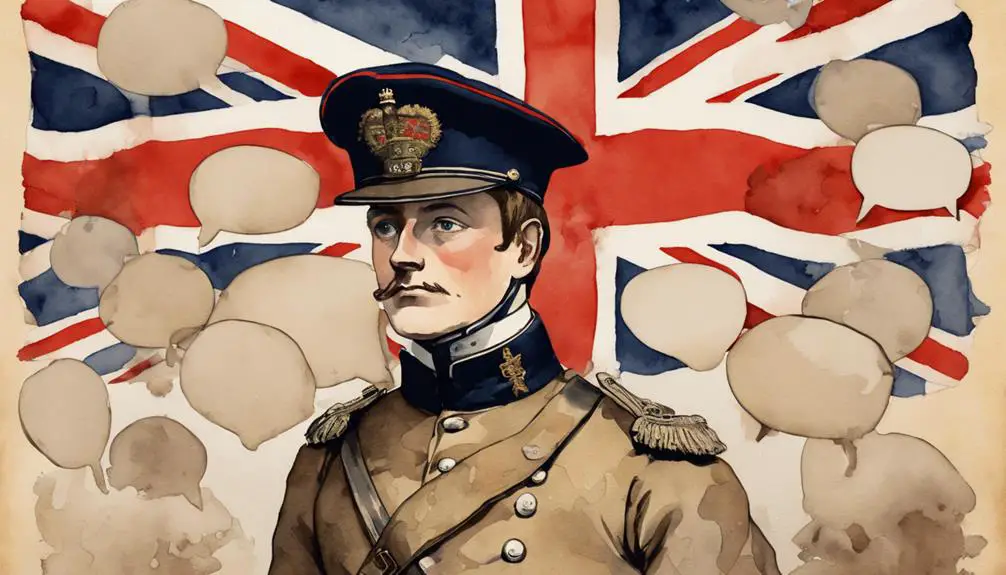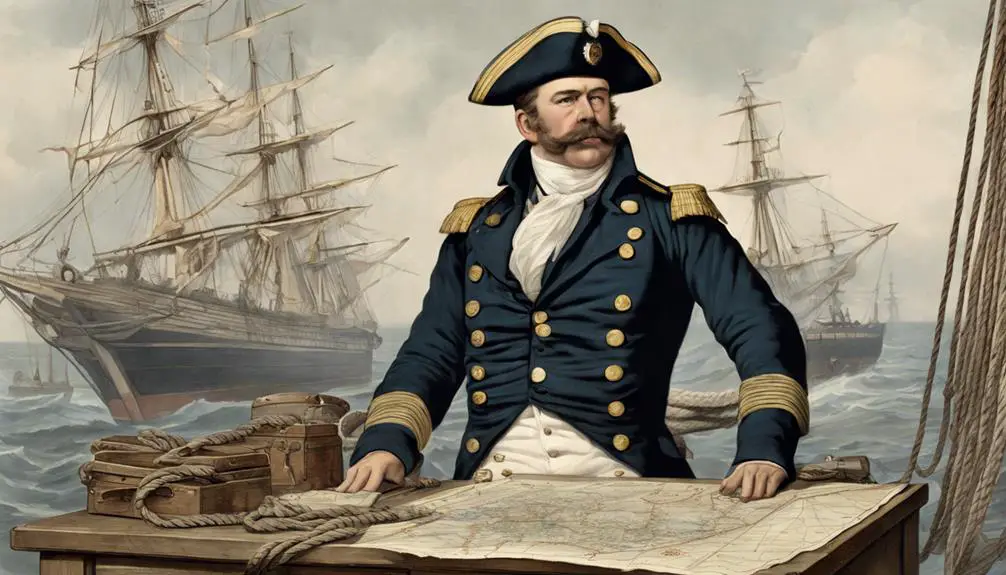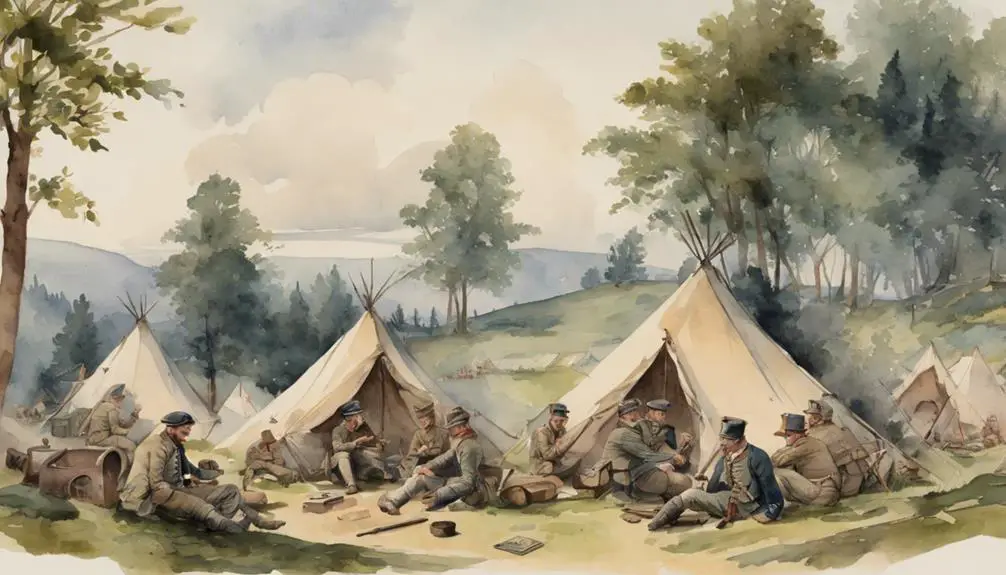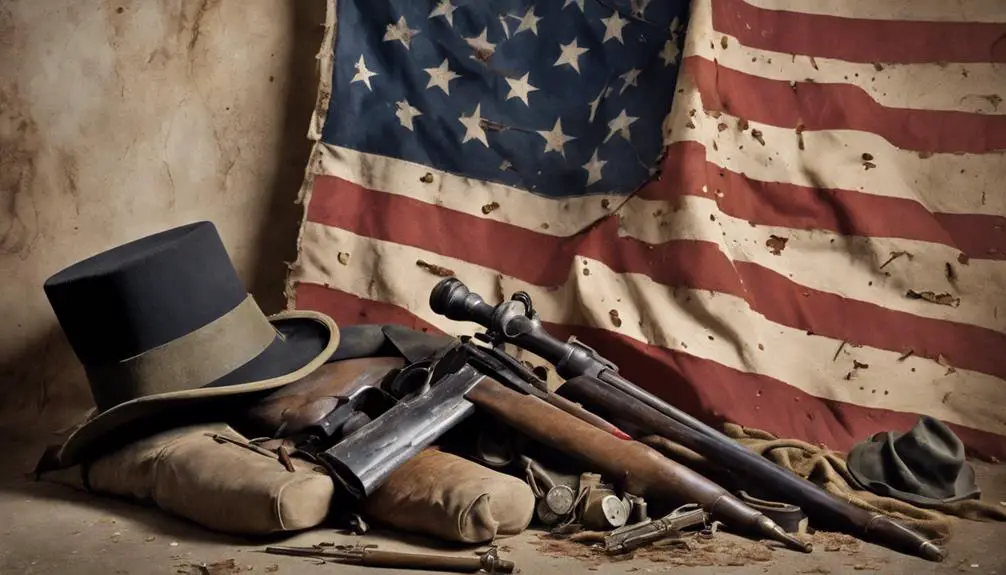As you explore 19th century military slang, you'll discover a unique language that reflected soldiers' experiences and helped them cope with the harsh realities of war. From the British Army's "Tommy" to the American Civil War's "Rebel" and "Yankee", each term reveals a glimpse into the camaraderie, humor, and struggles of soldiers. Naval jargon like "Anchor Watch" and "Sea Legs" highlights the distinct challenges of naval life. You'll also find phrases like "Got your back" and "Watch your six" that reveal the importance of support and awareness on the battlefield. As you dig deeper, you'll uncover more nuances of military life, and the slang that defined it. There's more to uncover, and the stories these words tell will surprise you.
Slang of the British Army

During the 19th century, you'd often hear British Army soldiers using 'Tommy' to refer to themselves, a term that originated from the fictional 'Tommy Atkins,' a generic name used in military example forms and documents. This nickname became an integral part of the British Army's slang, reflecting the camaraderie and esprit de corps among soldiers. Tommies' Tales, a collection of stories and anecdotes, showcased the humor and wit of British soldiers, who often used humor to cope with the harsh realities of war.
In the trenches, Blighty Banter, a unique blend of slang, colloquialisms, and witty remarks, became a staple of British Army communication. This informal language allowed soldiers to express themselves, share experiences, and bond with their comrades. Blighty, a term used to refer to Britain, symbolized a sense of longing for home and normalcy amidst the chaos of war.
Through Tommies' Tales and Blighty Banter, you get a glimpse into the lives of British soldiers, their struggles, and their resilience during the 19th century.
American Civil War Lingo
As you explore the lexicon of the American Civil War, you'll uncover a unique dialect that emerged among soldiers, characterized by colloquialisms, regionalisms, and inventive slang that reflected the conflict's brutal realities and the soldiers' everyday experiences. This distinct language was shaped by the harsh conditions, regional identities, and the clash of ideologies.
| Term | Definition |
|---|---|
| Rebel | A Confederate soldier |
| Yankee | A Union soldier |
| Johnny Reb | A Confederate soldier, used by Union soldiers |
| Battle Cry | A loud shout or phrase used to intimidate or rally troops |
The slang of the American Civil War era was often crude, humorous, and irreverent. Rebel slang, in particular, was marked by its folksy, rural flavor. Battle cries, like 'Forward, March!' or 'Charge!' were used to rally troops and strike fear into the enemy. These phrases, though simple, were potent expressions of military might. As you investigate further into the language of the American Civil War, you'll discover a rich tapestry of words and phrases that reflect the complexities and brutalities of this pivotal moment in American history.
Naval Jargon of the Era

You'll need to explore a distinct nautical lexicon when investigating the naval jargon of the 19th century, where sailors and officers relied on a specialized vocabulary to communicate efficiently and effectively on the high seas.
As you immerse yourself in the world of naval jargon, you'll discover a unique language that was essential for sailors to perform their duties.
Here are a few examples of naval jargon that will give you a taste of life on the high seas:
- Anchor Watch: a period of duty on deck while the ship is at anchor, typically during the night.
- Sea Legs: a sailor who's gained their balance and stability on a ship, no longer prone to seasickness.
- Keelhaul: a form of punishment where a sailor was tied to a rope and dragged under the ship's keel.
- Swab: to clean the decks, a menial task often assigned to new recruits.
Soldier Life on the Battlefield
While sailors navigated the complexities of naval jargon, soldiers on the battlefield relied on their own distinct vocabulary to navigate the chaos of war, where clear communication meant the difference between life and death. As you trudged through the muddy trenches, you'd hear phrases like "got your back" or "watch your six," emphasizing the importance of teamwork and situational awareness. When hunger pangs struck, you'd rummage through your pack for "hard tack" or "bully beef," the staple of battlefield rations. But the harsh reality of combat fatigue was always lurking, making every decision feel like a struggle.
| Term | Definition | Usage |
|---|---|---|
| Got your back | Having someone's support | "I've got your back, let's move out!" |
| Watch your six | Be aware of your surroundings | "Watch your six, sniper on the roof!" |
| Hard tack | Dry, crackers-like food | "Pass me that hard tack, I'm starving!" |
| Bully beef | Canned beef | "Bully beef and biscuits for lunch again…" |
| Combat fatigue | Extreme mental exhaustion | "Dude's got combat fatigue, give him a break."
Camp Life and Leisure Time

When not engaged in combat, soldiers in the 19th century retreated to camp life, where they relied on a unique set of slang terms to navigate the rhythms of daily routine and leisure time.
You, as a soldier, would have found solace in the familiar rituals and games that brought a sense of normalcy to your life in the barracks.
Here are some examples of camp life slang that evoke a sense of camaraderie and leisure:
- Mess Rituals: The daily meals in the mess hall were an essential part of camp life, where you'd gather with fellow soldiers to share stories and gossip.
- Barrack Games: In your downtime, you'd often engage in games like cards, chess, or checkers to pass the time and alleviate boredom.
- Crutch: A slang term for a soldier's favorite phrase or expression, often used to add flair to conversations.
- Snollygoster: A shrewd, cunning soldier who'd often take advantage of his comrades, but was still well-liked for his cleverness.
These slang terms not only added flavor to your daily conversations but also helped create a sense of community and belonging in the barracks.
Command and Communication
As you followed orders and received instructions from your superiors, the language of command and communication played an essential role in guaranteeing the success of military operations. Effective communication was crucial in conveying strategic plans, coordinating troop movements, and executing tactical maneuvers. In the heat of battle, clear and concise language was paramount to avoid confusion and ensure a unified response.
Battle cries, such as 'Fix bayonets!' or 'Forward, march!', were used to rally troops and signal specific actions. These cries were often loud, clear, and easily understood, even amidst the chaos of combat. In addition, cipher systems were employed to encrypt sensitive information, protecting it from enemy interception. These systems relied on complex codes and ciphers, requiring skilled operators to decipher the messages.
In the 19th century, military communication was a sophisticated art, blending traditional methods with innovative technologies. As you navigated the complex web of command and communication, you relied on a unique blend of verbal and written instructions, visual signals, and cryptographic techniques to stay one step ahead of the enemy. By mastering this language, you ensured that orders were carried out efficiently, and military objectives were achieved.
Frequently Asked Questions
What Inspired the Development of Military Slang?
To fully grasp the development of military slang, one must take into account the historical context of war, where cultural exchange and language barriers often led to communication breakdowns. On the battlefield, chaos reigned, and standard language was insufficient.
Social hierarchies within military units also played a role, as soldiers sought to differentiate themselves from their superiors. In this environment, slang emerged as a practical solution to facilitate efficient communication, ultimately becoming an integral part of military culture.
How Did Military Slang Affect Unit Cohesion?
Get ready for a reality check: you think you're a team player, but without military slang, you're just a lonely grunt. Seriously, though, it's time to examine how military slang affects unit cohesion.
You'll find that it fosters bonding rituals, creating a sense of cultural identity among troops. This shared language strengthens camaraderie, making you a more cohesive unit.
It's not just about slang; it's about belonging, and that's the real ammo for success.
Were Women Involved in Creating Military Slang?
As you explore the role of women in shaping military slang, you'll discover a fascinating story. Female linguists, Codebreakers, and cryptographers played a significant part in creating and deciphering military codes.
These slang pioneers, often overlooked, contributed to the development of military slang. Their work, though largely uncredited, had a profound impact on military communication.
You'll find that women's involvement in creating military slang is a remarkable, yet often hidden, chapter in the history of military language.
Did Military Slang Vary by Geographic Region?
You're wondering if military slang varied by geographic region.
The answer is yes, it did. Regional dialects played a significant role in shaping military slang.
For instance, Coastal influences brought nautical terms into the mix, while inland regions drew from rural dialects.
This diversity led to distinct vocabulary and expressions across different regions.
Were There Any Negative Consequences of Using Slang?
As you explore the world of military slang, you'll uncover a web of secret codes and colloquialisms that can be both a blessing and a curse.
But beware, using slang can have negative consequences. When language barriers and cultural misunderstandings arise, miscommunication can lead to disastrous outcomes.
In the heat of battle, a misinterpreted phrase can mean the difference between life and death.
Conclusion
As you reflect on the slang of the 19th century military, consider this striking fact: during the American Civil War, over 620,000 soldiers lost their lives – a staggering 2.5% of the US population at the time.
This grim reality underscores the gravity of the era, in which soldiers relied on slang to cope with the harsh realities of war. The lingo, jargon, and colloquialisms that emerged during this period reveal a complex tapestry of camaraderie, fear, and resilience.







